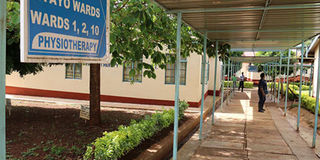Alarm as 60pc of doctors skip duty

Embu Level Five Hospital. Embu is one of the counties with the highest rate of doctor absenteeism. PHOTO | FILE | NATION MEDIA GROUP
What you need to know:
- Most health workers in urban areas had been granted permission to pursue further studies or attend workshops.
- Kenya Medical Association Secretary-General Simon Kigondu said a health service commission should be set up to address unique staff needs.
More than 50 per cent of doctors, nurses and clinical officers skip duty on any given day, a Kenya Health Service Delivery Indicator Report shows.
In the report conducted in 3,095 facilities across the country, doctors recorded the highest rates of absenteeism at 60.7 per cent. About 49.5 per cent of nurses and clinical officers also regularly skip duty.
National Council for Population and Development Director-General Josephine Kibaru said their absence was authorised by supervisors.
“In any workplace setting, absence may be authorised or unauthorised. From a consumer’s perspective, however, these providers are not available to deliver services at the facility, whether authorised or not,” Ms Kibaru said.
She said most health workers in urban areas had been granted permission to pursue further studies or attend workshops.
“Employers should strike a balance. How do they permit their staff to be absent and still provide quality services?” she quipped.
CAPACITY BUILDING
But, Kenya Medical Association Secretary-General Simon Kigondu said the fact that doctors had been granted leave from work should not be termed as absenteeism.
Mr Kigondu said the only way to ensure there was no gap when doctors attend training is by setting up a health service commission to address unique staff needs.
“Human resource is a critical pillar of any health system and the commission would be tasked to register all trained workers and address poor distribution of staff,” he said.
Mr Kigondu added that the commission, which would mirror the Teachers Service Commission, would also ensure that counties that have few health workers on account of their geographical location do not suffer a crisis.
“It is natural progression for doctors to advance their studies after three years, which is good for the country because we will then be able to attain quality healthcare. A commission would train them and address any imbalance by managing transfers,” he said.
ADVISORY COUNCIL
Health acting Director-General John Masasabi however dismissed the proposal, saying it’s “immaterial to set up a health commission”.
“The union has the right to agitate for what they want, which is absolutely okay. However, that is not what is in the law. The 2017 Health Act has talked about establishing a human resource advisory council, which will try to address such issues,” he said.
Mr Masasabi said absenteeism had dropped since 2006.
The report, which was done in conjunction with the World Bank and United Nations Population Fund, revealed absenteeism was highest in West Pokot (68 per cent) and Marsabit (66 per cent).
It was lowest in Makueni County, at 25 per cent. Kilifi, Lamu, Murang’a, Embu, Homa Bay and Turkana had the highest rate of doctor absenteeism, while West Pokot had the highest absenteeism among clinical officers at 78 per cent.
The research, conducted at level two, three and four facilities, showed nurses in Wajir recorded the highest rates of absenteeism at 80.7 per cent.




